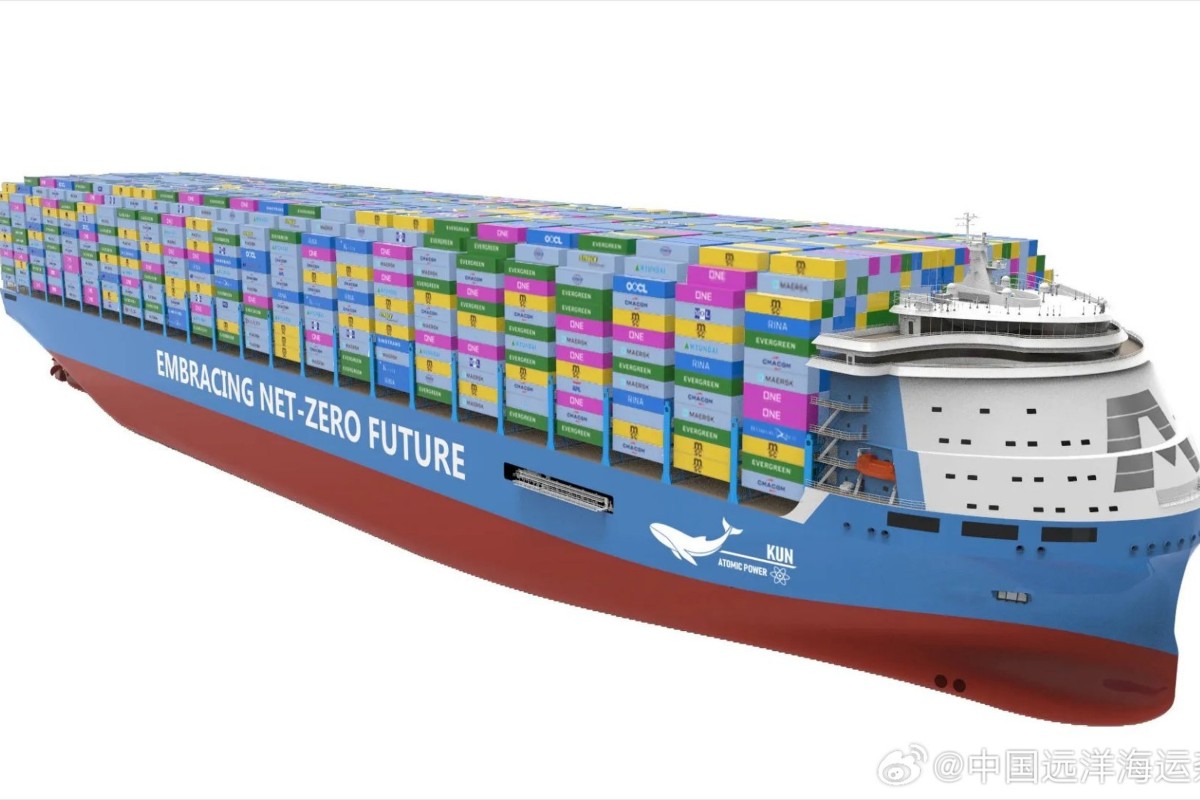Here the KUN-24AP container ship would be a massive departure with its molten salt reactor. Despite this seemingly odd choice, there are a number of reasons for this, including the inherent safety of an MSR, the ability to refuel continuously without shutting down the reactor, and a high burn-up rate, which means very little waste to be filtered out of the molten salt fuel. The roots for the ship’s reactor would appear to be found in China’s TMSR-LF program, with the TMSR-LF1 reactor having received its operating permit earlier in 2023. This is a fast neutron breeder, meaning that it can breed U-233 from thorium (Th-232) via neutron capture, allowing it to primarily run on much cheaper thorium rather than uranium fuel.
An additional benefit is the fuel and waste from such reactors is useless for nuclear weapons.
Another article with interviews: https://gcaptain.com/nuclear-powered-24000-teu-containership-china/



I don’t think these kinds of reactors are capable of producing huge safety concerns. MSR tanks are designed to deliberately flood themselves if they ever operate above a certain temperature.
And since it’s on a boat, if these safety features ever fail there is one option available that you do not have on land to prevent it from reacting uncontrollably, sink it. I can’t see any scenario where you wouldn’t be able to cool it down because of the unique access to water that exists. It’s only on land where your piping and other things can become irreparably damaged preventing you from getting the necessary cooling into the reactor.
If things get really bad in some way we couldn’t possibly predict any explosion on the ship will sink it anyway.
That still all depends on responsible people properly maintaining failsafes and being willing to scuttle the ship if necessary. Corporations cannot be trusted to do any of that.
I don’t think you need to rely on people to scuttle, if things get bad enough it will sink itself because it will melt a hole straight through the ship.
Potentially melting down in the middle of a shallow city harbour as an overworked skeleton crew is worried about their families back home getting evicted for not paying the rent all while the parent company does more layoffs and posts record profits in their quarterly reports.
As opposed to the mass extinctions caused by global warming going on right now??
What is your point that you are unwilling to hear safety concerns bc it’s worse right now? That’s why there is a mass extinction. We have to move away and address safety at the same time. If that means removing private companies from shipping, so be it.
Classic “letting perfect be the enemy of good” energy.
Which is an excellent argument for going back to wind powered ships. Who cares if the treats come a bit more slowly?
I’d love some engineers to do that, I think it’d be totally awesome. However, that hasn’t been done and we can only compare proposed solutions to existing ones, not hypothetical ones.
It’s much better to just reduce shipping volume than dive into the unknown without considering safe guards. Your making dangerous arguments that are following the same reckless ideas that got us here.
Which would require a global revolution to accomplish, vs a solution that reduces real harms right now. I thought communists weren’t supposed to be utopian?
The question kind of is what’s the other options. The organizational and economic pressure still applies to ICE ships. Not sure I’d be much happier about a normal tanker dumping a few thousand liters of crude oil on the coast.
That was a problem with the reactor designs of the 1950s to 1990s. Over the past half century a lot of smart people have put a lot of thought into idiot proofing nuclear reactors to prevent another three mile, chernobyl, or fukushima. Reactor designers no longer make optimistic assumptions about the operator and assume they are a shortsighted idiot that cannot be trusted to do the right thing.
In modern reactors temperature coefficients tuned to automatically prevent meltdowns is something regulators care a lot about when approving designs. Rather than focusing on building safety mechanisms that the operator can trigger (ie control rods), a natural safety mechanism is built into the formulation of the fuel so if it gets too hot it is no longer capable of nuclear fission.
This is especially the case in small modular reactor (smr) designs meant to be used in commercial applications where no one actually trusts the operator to be responsible. The fuel is formulated to sacrifice some efficiency in exchange for the reactor automatically SCRAMing even if the operator does everything in their power to keep it running.
There is also a push for SMRs to use things like the thorium fuel cycle because it makes the reactor pointless for terrorists or other bad actors to target. The thorium fuel isn’t useful for radiological attacks or bomb making, the only reason it even works as a fuel is because it can produce small amounts of uranium that are immediately reacted upon forming. This was the entire reason governments ignored these fuel cycles for decades, they didn’t create waste that could be used for weapons making. As a result terrorists are better off getting a shovel and collecting natural uranium off the side of highways in the deserts of North Africa or North America.
https://nuclearsafety.gc.ca/eng/resources/news-room/feature-articles/positive-void-coefficient-of-reactivity-CANDUs.cfm
https://en.wikipedia.org/wiki/Void_coefficient
https://en.wikipedia.org/wiki/Fuel_temperature_coefficient_of_reactivity
When will this human-centered design philosophy spread to other disciplines?
When it is too late
idk, are you homer simpson
deleted by creator